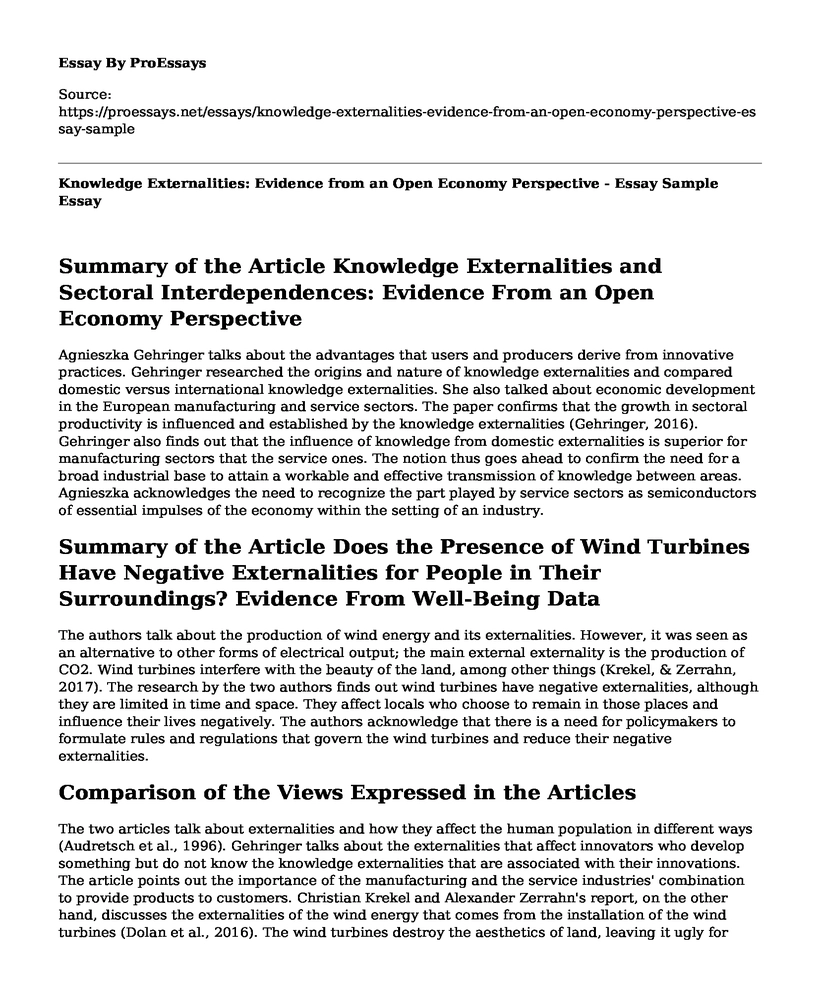Summary of the Article Knowledge Externalities and Sectoral Interdependences: Evidence From an Open Economy Perspective
Agnieszka Gehringer talks about the advantages that users and producers derive from innovative practices. Gehringer researched the origins and nature of knowledge externalities and compared domestic versus international knowledge externalities. She also talked about economic development in the European manufacturing and service sectors. The paper confirms that the growth in sectoral productivity is influenced and established by the knowledge externalities (Gehringer, 2016). Gehringer also finds out that the influence of knowledge from domestic externalities is superior for manufacturing sectors that the service ones. The notion thus goes ahead to confirm the need for a broad industrial base to attain a workable and effective transmission of knowledge between areas. Agnieszka acknowledges the need to recognize the part played by service sectors as semiconductors of essential impulses of the economy within the setting of an industry.
Summary of the Article Does the Presence of Wind Turbines Have Negative Externalities for People in Their Surroundings? Evidence From Well-Being Data
The authors talk about the production of wind energy and its externalities. However, it was seen as an alternative to other forms of electrical output; the main external externality is the production of CO2. Wind turbines interfere with the beauty of the land, among other things (Krekel, & Zerrahn, 2017). The research by the two authors finds out wind turbines have negative externalities, although they are limited in time and space. They affect locals who choose to remain in those places and influence their lives negatively. The authors acknowledge that there is a need for policymakers to formulate rules and regulations that govern the wind turbines and reduce their negative externalities.
Comparison of the Views Expressed in the Articles
The two articles talk about externalities and how they affect the human population in different ways (Audretsch et al., 1996). Gehringer talks about the externalities that affect innovators who develop something but do not know the knowledge externalities that are associated with their innovations. The article points out the importance of the manufacturing and the service industries' combination to provide products to customers. Christian Krekel and Alexander Zerrahn's report, on the other hand, discusses the externalities of the wind energy that comes from the installation of the wind turbines (Dolan et al., 2016). The wind turbines destroy the aesthetics of land, leaving it ugly for human beings. Some are also forced to move from their homes by the installation process of the turbines.
Contributions of the Articles to Environment and How They Deal With Externalities
The two articles have a positive influence on the current knowledge already, as they shed more light on what externalities are and how they affect people. For the innovation part, it is essential to know the domestic and international externalities related to production in the manufacturing and the service industries. Christian Krekel and Alexander Zerrahn’s article, on the other hand, educate about the issues associated with clean energy from the wind. Although, it is seen as an alternative from the use of non-renewable sources of energy and mainly from the emission of CO2 (Odermatt, & Stutzer, 2015). The installation of wind turbines affects the environment through the interference of land beauty. However, proper channels can be followed to make sure the issues are addressed, and the production of clean energy continues.
References
Audretsch, D., Feldman, M., 1996. R&D spillovers and the geography of innovation and production. Am. Econ. Rev. 86 (3), 630–640.
Dolan, P., Kavetsos, G., Krekel, C., Mavridis, D., Metcalfe, R., Senik, C., & Ziebarth, N. R. (2016). The host with the most? The effects of the Olympic Games on happiness.
Gehringer, A. (2016). Knowledge externalities and sectoral interdependences: Evidence from an open economy perspective. Technological Forecasting and Social Change, 102, 240-249.
Krekel, C., & Zerrahn, A. (2017). Does the presence of wind turbines have negative externalities for people in their surroundings? Evidence from well-being data. Journal of Environmental Economics and Management, 82, 221-238.
Odermatt, R., & Stutzer, A. (2015). (Mis-) predicted subjective well-being following life events.
Cite this page
Knowledge Externalities: Evidence from an Open Economy Perspective - Essay Sample. (2023, Aug 12). Retrieved from https://proessays.net/essays/knowledge-externalities-evidence-from-an-open-economy-perspective-essay-sample
If you are the original author of this essay and no longer wish to have it published on the ProEssays website, please click below to request its removal:
- Introduction to Macroeconomics
- Communism, Capitalism, and Socialism Essay
- Globalization in Financial Market: A Review of Research and Theories - Essay Sample
- Employee Health: Promoting Safety and Well-Being in the Workplace - Research Paper
- Unemployment & Poverty: Sub-Sahara's Woes & Economic Fluctuations - Essay Sample
- Living in a Foreign Country: Introduction to Challenges & Benefits - Essay Sample
- Pay-for-Performance: Incentivizing Employee Productivity for Business Growth - Essay Sample







